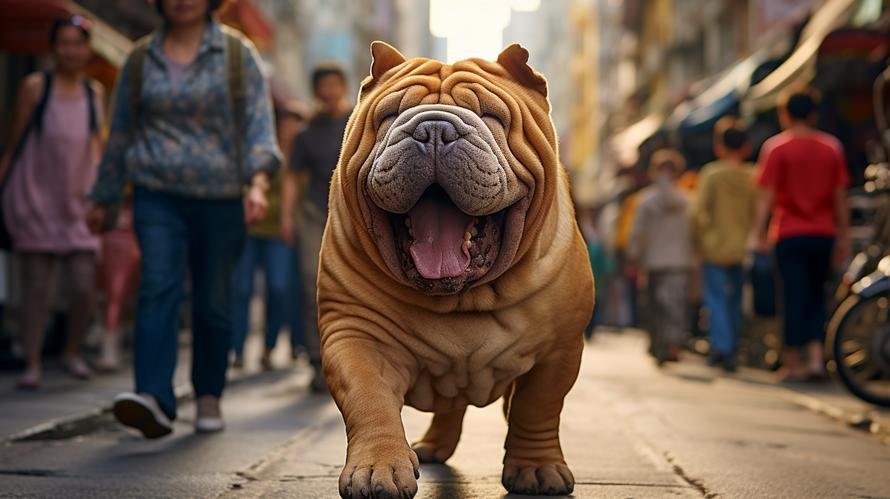You might be familiar with the Shar-Pei’s unique appearance – those deep wrinkles and that blue-black tongue. They became quite popular in the ’80s, thanks to their distinctive looks. But there’s a lot more to know about this ancient breed than meets the eyes!
Starting with the fact that they’re one of the rarest dog breeds in the world. The Shar-Pei comes from China, where it’s still revered today as one of the most original breeds. But it’s not just their looks that set them apart – these are hardy dogs, known for their strength and tenacity.
So, is Shar-Pei a dangerous dog? To start addressing this question, we first need to understand one thing: no breed itself poses an inherent danger. The behavior of a dog is a result of its individual personality, upbringing, environment, and treatment. That said, let’s look at the traits and characteristics of the Shar-Pei breed.
Shar-Pei dogs are known to be naturally defensive, independent, and somewhat aloof. A well-trained Shar-Pei is usually loyal and loving to its family, while being wary of strangers. They have a strong protective instinct which can make them ideal watchdogs. But, without the right socialization, a Shar-Pei’s protective nature can sometimes veer into aggressive behavior, mostly if they feel that their territory or family is threatened.
Does this make them ‘dangerous’? Not necessarily. It just means they’re a breed that needs the right introduction to the world and the correct environment to thrive.
Socialization is key for any dog breed – but particularly for those with guarding instincts like the Shar-Pei. Introducing them to a variety of people, situations, and animals from a very young age can help them understand that the world is a friendly place. This, in turn, will prevent unnecessary fear-based reactions later in life.
Training is just as important too. As a breed, Shar-Peis love to learn and work, which means that a well-trained Shar-Pei can be a wonderful companion. Consistent, positive reinforcement is the best way to train these dogs, while harsh treatment can push them to become aggressive.
Clearly, the real question here isn’t: “Are Shar-Peis dangerous?” but “Are we giving Shar-Peis the right environment they need to grow up sociable and friendly?”.
It’s also essential to understand that a dog’s physical health can sometimes impact its behavior. The Shar-Pei is unfortunately prone to several health issues – including skin disorders, hip dysplasia, eye conditions, and a unique fever disorder called Shar-Pei Fever. A dog that’s feeling unwell or in constant pain is more likely to react negatively. So regular health checks and prompt veterinary attention when necessary is a must.
Despite some of the challenges that come with owning a Shar-Pei, don’t let that discourage you. If appropriately bred, socialized, and trained, a Shar-Pei can make a loving, loyal, and devoted pet who is never a ‘danger’ to its family.
In conclusion, keep in mind that any dog, regardless of its breed, can become a problem if not appropriately handled. Remember – there’s no such thing as a bad breed. There are just bad owners. By understanding and adapting to the needs of a Shar-Pei, you can ensure that you’re rewarded with a four-legged friend who’s truly a joy to spend time with.
Finally, it’s a good idea to seek advice from professionals or other Shar-Pei owners if considering adding one of these unique dogs to your family. Their experience and wisdom can help guide you towards a harmonious and rewarding relationship with your Shar-Pei, ensuring that your dog is a family pet, not a danger.



